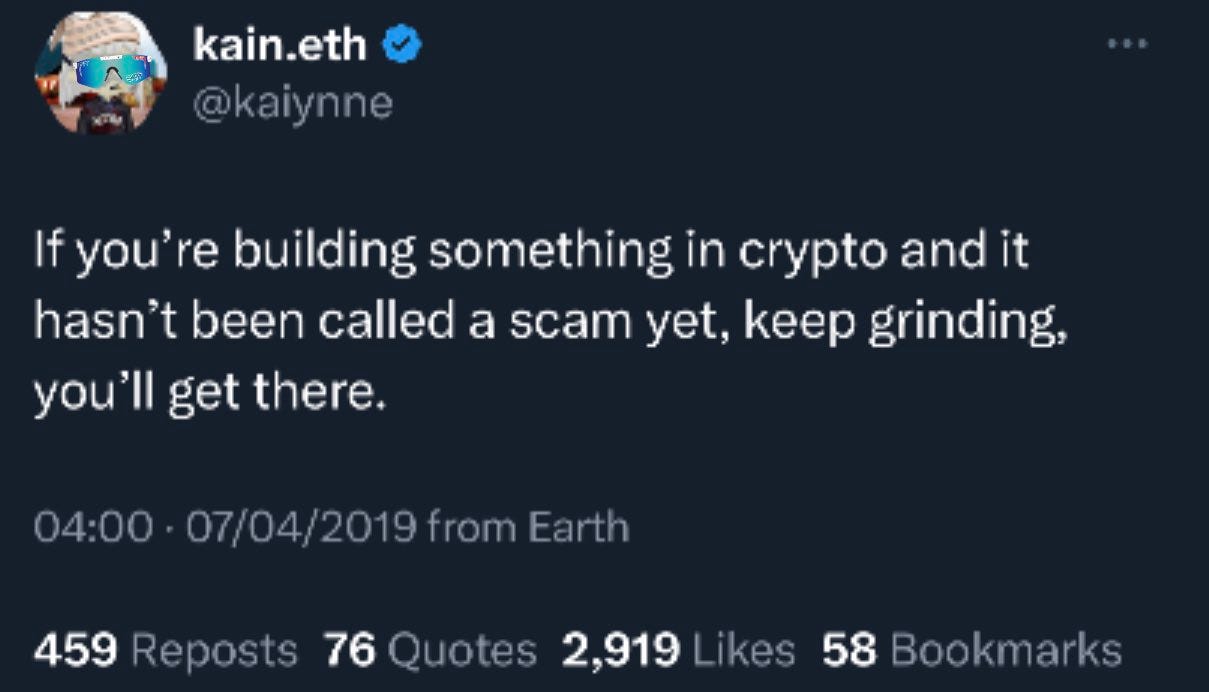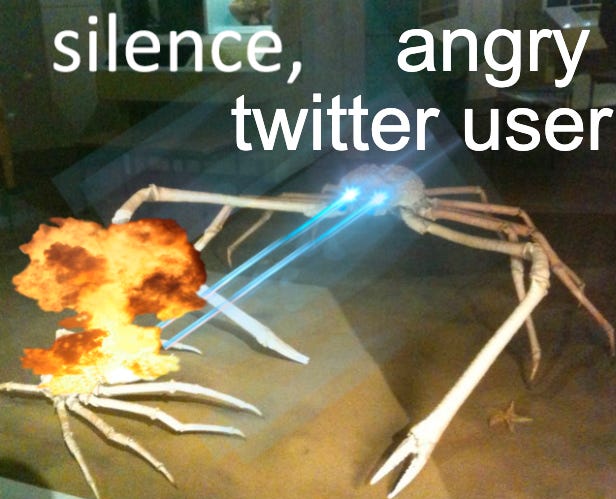How Friend Tech nerfs the angry people
And why CT encourages everyone to be so mad all the time
Many years ago, I came across a blog post by Tim Ferris titled "11 Reasons not to become famous."
It wasn't until recently when about half of Twitter seemed to demand Ansem's imprisonment, arrest, humiliation, or burning at the stake due to a slight drop in one of the tokens he mentioned that the article was beamed directly back into my brain.
You can read the article yourselves to get all the lessons - they are actually really valuable and moulded my thoughts on why being famous is actually kind of dumb.
But for me, the key takeaway is this:
Think back to your time in school. Maybe your class had 30 people; maybe your year group had a few hundred people, maybe a few thousand in your school?
From my experience anyway, the vast majority of my classmates were normal, kind, and friendly.
But there were always a handful that were a bit different. A bit angrier. A bit more violent. A bit more manipulative, nasty, and cruel. Bullies. Kids that would fight. Kids that would bring weapons to school. Kids that would steal cars. Kids that would get suspended for attacking elderly people unprovoked. Kids that later on ended up in jail.
Now, that was from a sample size of maybe sub 1,000 people.
Ansem has 122,000 Twitter followers.
If we do some basic extrapolation from our own lived experiences, we can quite quickly conclude that from within the 122,000 followers, there will be a significant number of truly hateful, angry, nasty people.
A large number of adults with additional needs perhaps who through no fault of their own are predisposed to this kind of behaviour.
It wouldn’t matter what Ansem did, what he tweeted, the coins he spoke about, if the number went up, if the number went down.
When you have such a large number of followers, it’s mathematically very likely that you attract people who specifically want to see you fail and even take joy in it.
Twitter emboldens this behaviour too. Negative tweets receive more engagement.
Doom-mongering, calling everyone scammers, predicting catastrophe, or calling every token to zero gets more likes and retweets than thoughtful nuanced thought.
It’s a melting pot of adversarial fighting, often in bad faith, and almost always lacking nuance. Add in the fact that on CT, everyone has actual, real, sometimes life-changing money at stake, and the temperature rises further.
Haters and angry people are emboldened, sensible, thoughtful people pushed out as the battle is rarely worth the mental energy.
It’s no wonder then that so many feel disillusioned with Twitter. Who wants to log in somewhere every day to feel angry and get shouted at?
It’s also one of the main reasons I believe that Friend Tech has captured so much attention, and the vast majority of larger CT users are actually active and posting there.
Of course, critics will suggest that they are just doing it for the money and the fees. (Fees are mostly front-loaded from initial trading, so I don’t believe this argument is entirely accurate)
But I think there is more to it.
Having a private room where your followers only see your thoughts, and aren’t swayed or influenced by hordes of angry commenters is very refreshing.
It makes sharing nuanced, sometimes controversial thoughts more likely as there won’t be 100 bots or shouty people telling you you’re the dumbest person ever to exist because that thought crossed your mind. It’s likely that the people in your chat room are there specifically to ask you questions and find your ideas valuable. They’ve sometimes paid significant funds to be there, so incentives are aligned.
The crazy angry people feed on the engagement they get from people liking their quote tweets calling for you to go to jail because you once liked a tweet about a dog coin that only went up 6%.
THEY DO NOT GET THIS ENGAGEMENT ON FRIEND TECH.
The creator can simply not reply, and no one will ever know or see that the comment has been made. It nerfs the haters in a fantastic way!
It’s for this reason that I find myself spending far more time on FT now than I do on CT. It’s the first thing I check every morning, and it’s improving each day.
I can go from a chat room with an economist talking about the impact of interest rates on the housing market, to my friend posting Gym tips and advice on how to get stronger, to a chat filled with wholesome sunsets and photos of their tractor.
None of these things would have been posted on Twitter because it lacks the intimacy and perceived privacy of a small closed group filled with people who want to be there because they like you, not because they want to score internet points by deriding you.
Of course, maybe this all changes when the number goes down. Maybe people who purchased access believing it to be an investment contract will get angry and shouty at some point too. But with Friend Tech capping holders' ability for virality, I suspect it will be far more limited than it would be on other social media mediums.
Anyway, that's enough of my ramblings on this topic for one day.
In summary, fame and celebrity are probably bad. Friend Tech makes it slightly less bad (for now).
Have a great Sunday!





